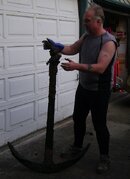scubadude223
Contributor
- Messages
- 143
- Reaction score
- 7
Part of the reason I carry the AL 80 and the AL 40 is for safety but also,
To impress the ladies on the beach
To impress the ladies on the beach
Welcome to ScubaBoard, the world's largest scuba diving community. Registration is not required to read the forums, but we encourage you to join. Joining has its benefits and enables you to participate in the discussions.
Benefits of registering include
It only impresses them if you stuff it down your shorts...[emoji6]Part of the reason I carry the AL 80 and the AL 40 is for safety but also,
To impress the ladies on the beach
FYI. To the ladies on the dive boat, you just look like an air hog.Part of the reason I carry the AL 80 and the AL 40 is for safety but also,
To impress the ladies on the beach

I normally ignore your posts, but for some reason I read this one and will respond.
In all courses the primary value of the course is in what you learn. In some cases, the card that comes with it provides no extra value. For example, if you take a specialty course in digital photography, you may learn a tremendous amount in the course, but the card that comes with it provides no real extra value. No one is ever going to stop you from using a camera under water if you don't have that card.
In other cases, the learning is valuable and the card is necessary for certain activities. I have many such cards. If I decide to go cave diving in Ginnie Springs, my Cave Diver card is a requirement, and if I want to use my scooter in the cave, my DPV in an overhead environment card is a requirement. If I want to dive the wreck of the RBJ in south Florida, I will probably need to show my advanced trimix card. If I want to get my decompression bottles filled with oxygen, I will need to show my advanced nitrox card. The tech courses I teach allow divers to go to different depths and uses different decompression gases. They may run into a dive operation that will not check, but the odds are they will have to produce the correct card to do the dive they want to do.
As for solo diving, there are lots of places where you can just show up at the water's edge, put on your gear, and go for a pleasant solo dive. No one will care, and no card will be required. If you are going to go in off a commercial boat, the dive operator will have rules, and those rules may require a card. That is what I meant by my post.
In summary, if you are going to do advanced diving, training and experience is always required, and sometimes a card showing you have that training and experience is required as well.
I don't own a solo card. When the class first started being offered I read the book, and realized that I already knew more about the subject than was in it ...But despite my experiences, there have been trips I've gone on where ... because I don't have the card ... I was denied access to solo dives that were granted to people with a fraction of my skill and experience, but who had the card. I'll accept that ... their dive op, their rules ... and as their client it's not my place to question them

